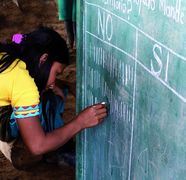
In 2009, the Embera indigenous people of Chocó, accompanied by CIJP, voted against mineral exploitation in their ancestral territory. [Photo: KOLKO]
Article published in the special Newsletter '15 years of PBI', October 2009
Alessandra Miraglia, volunteer from Italy (2008-9)
The raid on the CIJP office is one of many attacks against the organisation. Nonetheless, they continue to accompany communities.
PBI interviewed Luz Alba Santoyo, associated with the Inter-Church Justice and Peace Commission (CIJP) in two stages. During the first, from 1993 to 1999, she worked in the then Inter-Congregational Justice and Peace Commission (Comisión Intercongregacional de Justicia y Paz) directly supporting the work of Father Javier Giraldo, who was the organisation’s legal representative. She returned to the CIJP in 2006 and is currently responsible for the documentation centre.
PBI: Justice and Peace’s office was the target of a raid in 1998. Can you describe what happened in during that operation?
Luz Alba Santoyo: The raid on the headquarters began at one o’clock in the afternoon on 13 May 1998. It was authorised by the terrorism unit of the Regional Public Prosecutor’s Office in Bogotá, and was carried out unlawfully by army officers and members of the Cuerpo Técnico de Investigación (Technical Investigation Corps of the Public Prosecutor’s Office), many of them experts in recovering computer documents1. Other soldiers surrounded the building and prevented CIJP members who had gone out to lunch from returning, which left only a few members of the organisation in the office 2. Entry was also denied to representatives from the Office of the Human Rights Ombudsman, the Office of the United Nations High Commissioner for Human Rights, and the Colombia Conference of Bishops. No government officials were present 3.
PBI: What do you think was the motive behind the raid?
LAS: The raid was in response to military intelligence reports, according to which there was an ELN arsenal, explosives and propaganda in the building. The operation was in line with the interests of the 13th Brigade, commanded by General Rito Alejo del Río, who has been repeatedly condemned by CIJP, both for the crimes perpetrated in Urabá when he was in command of the 17th Brigade, and for his alleged links with paramilitarism 4. The soldiers concentrated on the Nunca Más (Never Again) project, a database which held information on the crimes against humanity committed in Colombia from 1966 onwards 5. Those conducting the raid pointed their weapons at the people there, confiscated their identity documents, intensively interrogated them, and branded them «guerrillas» 6. After preventing them from having outside contact, they began filming them and checking over and reading documents, examining the computers and copying their contents 7.
PBI: What were the implications of the raid for the Justice and Peace Commission?
LAS: On the one hand, it was a severe blow to the CIJP since it led to Father Giraldo leaving the organisation, as he was declared a military target and forced to go into hiding 8. On the other, it has made the Commission stronger, and it has continued to face false legal accusations levelled at some of its members, such as Father Giraldo, Abilio Peña and Danilo Rueda. None of them have ever been found guilty of any offence 9.
1 «Public Statement by the Inter-Congregational Justice and Peace Commission on the events of 13 May 1998», CIJP, 18 May 1998
2 Interview with Luz Alba Santoyo, Bogotá, 22 July 2008
3 «Statement by the Chairman of the Colombia Conference of Bishops, Alberto Giraldo Jaramillo, on the raid on Justice and Peace», Colombia Conference of Bishops, Bogotá, 14 May 1998
4 «Public Statement by the Inter-Congregational Justice and Peace Commission on the events of 13 May 1998», CIJP, 18 May 1998
5 «Reaction to the raid on the Justice and Peace Headquarters in Bogotá», Human Rights Defenders’ Ad Hoc Committee, 16 May 1998
6 «Public Statement by the Inter-Congregational Justice and Peace Commission on the events of 13 May 1998», CIJP, 18 May 1998
7 Father Peter Schorr:«Letter to the Public Prosecutor’s Office», International Office of Justice, Peace and the Safeguarding of Creation, Rome, 21 May 1998
8 «The threats to human rights continue in Colombia», CIJP, 10 July 1998
9 Interview with Luz Alba Santoyo, Bogotá, 22 July 2008
--
Danilo Rueda, member of the CIJP
«CIJP was the victim of eight legal actions between 1997 and 2008. We have received seven death threats, a kidnapping last year, two attempted forced disappearances and a murder. When repression with bullets and intimidation fails to work, they try judicial persecution.
It’s been difficult for our organisation because instead of being able to think about protecting the population’s human rights and about how to be more legally effective in regaining land, we are having to defend ourselves from false charges.
In addition, there has been illegal phone-tapping of members of CIJP. It’s been over a month and a half since this illegal tapping came to light, and so far the Public Prosecutor’s Office has not allowed us to protect our legal rights, we haven’t been able to gain access to the files which cover the work which we legitimately perform and our family lives. It’s a way of exerting psychological pressure, creating doubts about us and therefore seeking to make it impossible for us to accompany the communities on a permanent basis».
